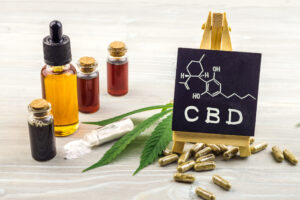In recent years, CBD has leapfrogged from the fringes of the health food co-op to the mainstream, quickly becoming the darling of the wellness industry. While celebrated for its potential therapeutic effects, what many overlook is the complex dance it does with prescription medications. With an increasing number of individuals incorporating CBD into their daily health regime, a discussion about the potential pitfalls of mixing this cannabinoid with specific drugs is not just pertinent but crucial.
—
Understanding CBD: What You Need to Know
The CBD (cannabidiol) phenomenon is not just a passing fad; it’s an industry growing at an explosive rate. Sourced predominantly from the hemp plant, CBD is a non-psychoactive component known for its potential to relieve pain, reduce anxiety, and alleviate certain health conditions. It’s worth understanding the basics for anyone considering or currently using CBD.
What is CBD and Where Does It Come From?
CBD is one of over 100 known cannabinoids naturally occurring in cannabis. It can be extracted from marijuana plants or more commonly from hemp plants for industrial purposes. Unlike tetrahydrocannabinol (THC), the psychoactive compound in cannabis, CBD does not produce a high. It is found in a variety of forms, including oils, tinctures, creams, and even edibles.
Common Uses and Benefits
The supposed benefits of CBD are incredibly wide-ranging, largely feasted upon a growing body of anecdotal evidence and preliminary research. It is heralded for its anti-inflammatory properties, making it a potential remedy for many ailments. Some claim it eases the symptoms of anxiety, depression, insomnia, and migraines, while there are even reports of it helping with conditions like epilepsy and Parkinson’s disease.
Legal Status and Regulations Surrounding CBD
The legal landscape of CBD use is as varied as the conditions it purports to treat. In many places, it is legal to purchase and consume CBD as long as it contains less than 0.3% THC. Regulations around marketing it as a health product, however, are in flux globally. Consumers must verify local laws and ensure that what they are buying complies with their region’s regulations.

The Science Behind CBD and Drug Interactions
The magic of CBD is not just in its promised benefits, but in its molecular circus with medications it meets along the way. While CBD has been touted as safe and well-tolerated, research is emerging that it can have a significant impact on the metabolization of a variety of pharmaceuticals.
Metabolism and the Cytochrome P450 System
The Cytochrome P450 (CYP450) complex is a group of enzymes found in the liver that are crucial for the metabolism of many commonly prescribed medications. CBD, it turns out, can inhibit the activity of certain CYP450 enzymes, potentially leading to the concentration of drugs in the system reaching unsafe levels. On the flip side, CBD may also induce the activation of certain enzymes, causing drugs to be metabolized too quickly and effectively leaving the patient underdosed.
What drugs should not be taken with CBD?
The list of drugs that have the potential to cause interactions with CBD is extensive and diverse, including:
- Antidepressants and Anxiolytics: Drugs such as Prozac or Xanax, which are metabolized by CYP3A4 and CYP2C19, could have their levels affected by CBD.
- Antibiotics: Macrolide antibiotics like erythromycin can interact negatively with CBD, potentially leading to an increased risk of side effects.
- Blood Thinners: The effectiveness of certain blood-thinning medications, like warfarin, could be compromised if taken with CBD.
Specific Examples of Drugs that Interact with CBD
A notable example is the anti-seizure medication clobazam. CBD has been shown to increase clobazam levels, which could lead to an increased risk of side effects such as sedation. A similar effect is seen with the immunosuppressant tacrolimus, posing risks for transplant patients.
—
Potential Risks and Complications
The consequences of unanticipated drug interactions can be dire. Patients might experience an increase in severe side effects related to the intensity of the drug’s action. Alternatively, if drugs are metabolized too quickly, it might render medication ineffective and leave underlying conditions inadequately treated. It’s an intricate health puzzle with serious consequences if the pieces don’t fit together perfectly.

Side Effects and Health Risks
Side effects aren’t the only concern; there’s also the risk of unknown complications. In a poorly functioning liver or with excessive doses, the impact of CBD on medication could be unpredictable and dangerous. It’s also worth noting that the potential risks of CBD-drug interactions are exacerbated in older adults, who are more likely to be on multiple medications and to be using CBD for pain management or other age-related symptoms.
Real-Life Examples of CBD Medication Interactions
The literature is still catching up with anecdotal evidence, but case studies are beginning to appear. Instances of patients experiencing severe adverse reactions to medications when used concurrently with CBD are becoming more common. This includes increased clozapine levels resulting in more adverse effects, as well as reduced efficacy of hormonal birth control when combined with CBD.
—
Navigating the Waters: How to Safely Use CBD with Medications
Given the potential complexities, it’s essential to handle CBD and medications with extreme care. Here are steps to ensure a safer path when navigating the potential pitfalls of CBD-drug interactions.
Guidelines for Patients Using CBD
Patients should be forthcoming with their healthcare providers about their CBD use. This includes mentioning the frequency and dosage, to ensure that there’s an awareness of how it might impact any prescribed medications. While guidance is forthcoming on how to mitigate these interactions, patients should err on the side of caution.
Healthcare Providers’ Role in CBD Management
Healthcare providers need to stay informed of the latest research and recommendations on CBD-drug interactions. To this end, professional teams and organizations are working to provide guidelines, but it’s incumbent on individual practitioners to stay updated. In health assessments, providers must ask explicit questions about CBD use to inform better medication management.
Recognizing and Managing Potential Interactions
For patients, recognizing signs of interaction is critical. Any unusual side effects should be reported immediately. Managing potential interactions involves development of a clear plan with a healthcare provider, potentially involving adjustments to the CBD dosage, the medication regimen, or both.
The Way Forward: More Research and Solutions
The need for more research in this field is unmistakable. Clearer guidelines for healthcare providers and consumers will require a deeper understanding of the breadth and depth of potential interactions. Solving this puzzle involves further studies and industry collaboration to elevate safety across the board.
How Much CBD Should You Vape For Anxiety? – Product Description
Take back control of your calm with “how much CBD should you vape for anxiety?” – your tailored solution to managing daily stresses. Our vape oil is meticulously crafted to offer you a quick and potent respite from anxiety, utilizing the highest quality pure CBD extracts. Designed for modern living, our product promises to deliver not just peace of mind but a serene experience with every puff.
Key Features:
- Fast-Acting Relief: Outpace anxiety with swift soothing effects thanks to our precisely formulated CBD vape oil.
- Pure CBD, Zero THC: Revel in the benefits of premium CBD without any THC-induced high. Appease your nerves without compromising clear thinking.
- Custom Concentrations: We understand that not one size fits all. Choose from a variety of strengths to find the perfect dosage that aligns with your body’s needs.
- Universal Compatibility: Our oil is designed to fit seamlessly with most standard vape devices, ensuring you can enjoy your CBD experience with your preferred equipment.
- Quality You Can Trust: Each batch undergoes rigorous third-party lab testing, ensuring that you receive a safe and reliable product.
- Holistic Health Promise: With non-GMO and gluten-free ingredients, you can vape knowing you’re inhaling wellness that aligns with your lifestyle.
Benefits:
- Personalised Dosage Control: Tailor your CBD intake to address your individual stress levels and anxiety triggers.
- Conscientious Consumption: Benefit from a product free of psychoactive effects, allowing you to remain focused and alert.
- Pure Satisfaction: Relish in the smooth, natural essence of high-grade CBD with each inhalation.
- Ease of Use: Convenient and fuss-free, our CBD vape oil integrates effortlessly into your daily routine, providing relief whenever and wherever you need it.
- Certified Safety: Sleep easy knowing you’re using a product certified for purity and safety.
Experience the fusion of tranquility and purity with “How Much CBD Should You Vape For Anxiety?”. Whether you’re at home or on the go, achieve a serene state of mind as you vape away the anxieties of life. Select your ideal concentration and start your journey towards a calmer, more centred you today.
